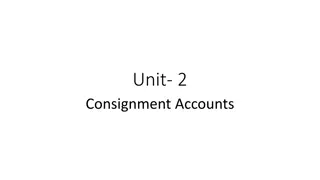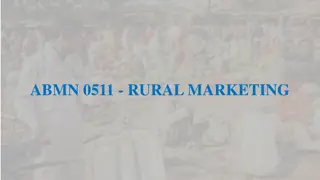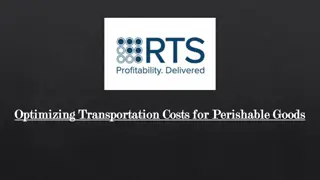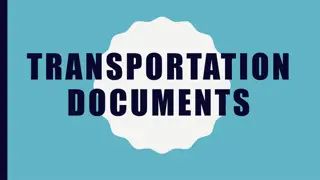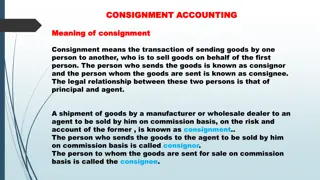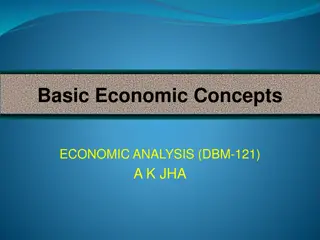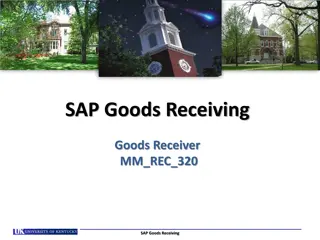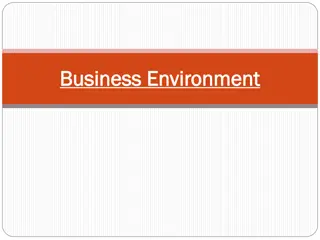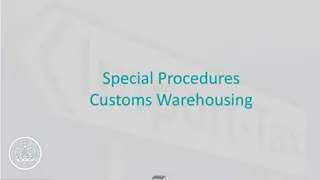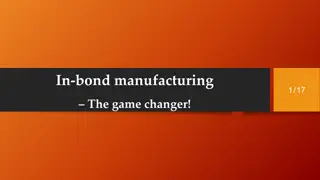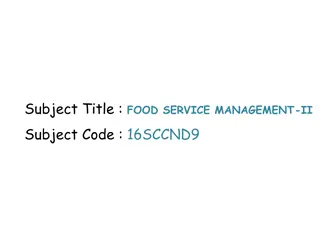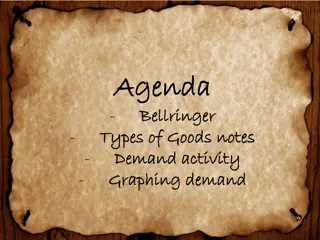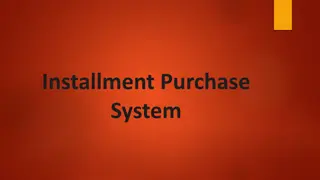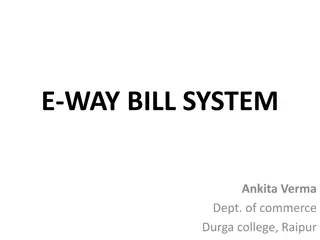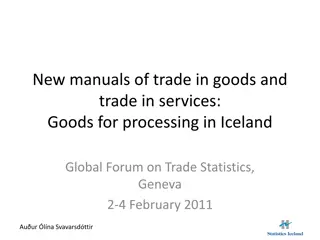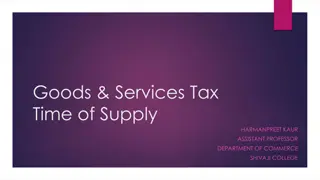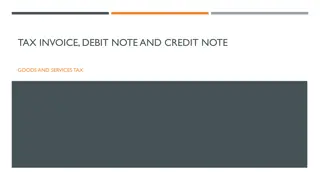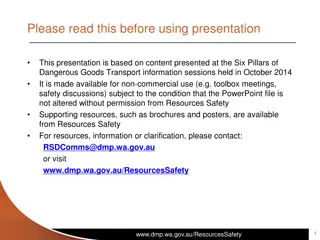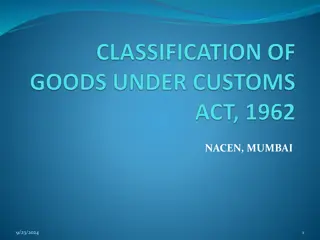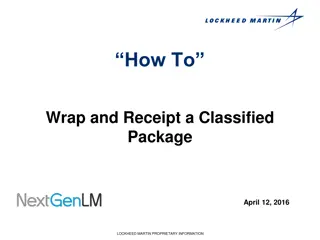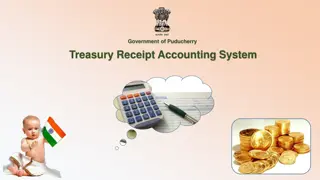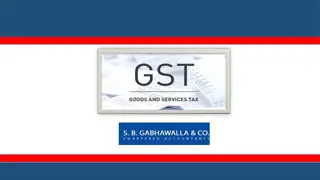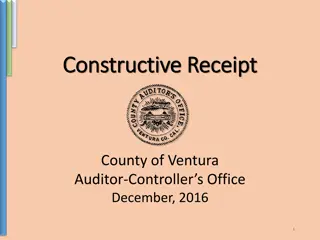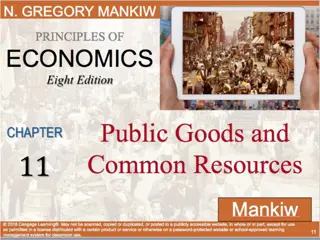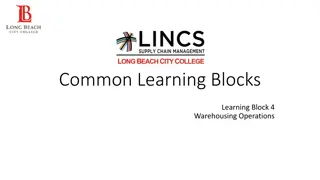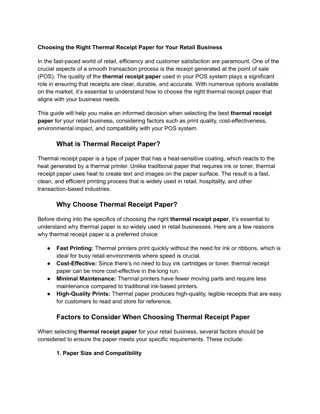Understanding Consignment Accounts in Business
Consignment accounts involve the sending of goods by a consignor to a consignee for sale on the consignor's behalf. The consignor remains the owner of the goods until they are sold, and the consignee sells the goods, collects money from customers, and receives commissions. Various types of commissio
9 views • 22 slides
Factors Influencing Economic Growth: Human Capital and Capital Goods
Factors such as investment in human capital, capital goods, natural resources, and entrepreneurship play a crucial role in determining a country's economic growth. Human capital encompasses the skills and abilities of workers, while capital goods are the tools and equipment used to produce goods and
2 views • 28 slides
ABMN 0511 - RURAL MARKETING
Rural marketing in India involves the flow of goods and services from producers to rural consumers, encompassing demand estimation, product planning, distribution, and ensuring consumer satisfaction. Key components of rural markets include the presence of goods for transactions, buyers and sellers,
1 views • 15 slides
Optimizing Transportation Costs for Perishable Goods
In the realm of logistics, the transportation of perishable goods presents a unique challenge. From fresh produce to pharmaceuticals, these time-sensitive commodities require specialized handling and efficient transportation to maintain their quality and integrity. One of the critical aspects of man
2 views • 6 slides
Understanding Transportation Documents in International Trade
International trade relies on various documents to facilitate transactions, including transportation documents, invoices, and insurance policies. These documents are crucial for commercial operations and compliance with exchange control regulations in different countries. Main transportation documen
5 views • 41 slides
Streamlining Good and Services Reconciliation Procedures
Streamline your reconciliation procedures for goods and services efficiently with detailed steps on user profiles, logging in, activating receipts, email verification, e-receipt handling, and delegate submission. Enhance accuracy and compliance with organized workflows and tools.
0 views • 21 slides
Understanding Consignment in Accounting
Consignment in accounting involves sending goods from a consignor to a consignee for sale on commission basis. The consignor retains ownership until the goods are sold. The relationship is that of principal and agent, with the consignee handling sales and remitting net proceeds. Important terms incl
1 views • 7 slides
Mastering Desktop Receiving in PeopleSoft eProcurement
Explore the functionality of desktop receiving in the PeopleSoft eProcurement module to efficiently manage goods receipt processes in your department. Learn how to receive, review, sort, and reject ePro goods, along with creating desktop receipts for Office Depot Purchase Orders. Understand the step
0 views • 14 slides
Understanding Basic Economic Concepts: Needs, Wants, Goods, and Services
Exploring fundamental economic concepts such as needs versus wants, goods, services, and products. Learn about the differences between goods and services, types of goods related to income, types of goods related to price, and types of goods related to consumption ability.
0 views • 11 slides
SAP Goods Receiving Training Overview
SAP Goods Receiving training covers the process of confirming receipt of goods or services within a department. It includes roles, training requirements, process flow, transaction codes, and various functionalities related to Goods Receiving in SAP. The training targets individuals authorized to rec
1 views • 52 slides
Understanding Business Environment and Objectives
Business encompasses a wide range of activities related to the production and distribution of goods and services, influenced by various interpretations from consumers, governments, and environmentalists. It involves activities like buying, selling, manufacturing, and service provision, all aimed at
0 views • 61 slides
Understanding Customs Warehousing and Simplified Customs Declaration Procedures
Customs Warehousing is a special procedure that allows goods to be stored in the UK while customs duties and import VAT are suspended. It aims to facilitate trade by providing duty suspension for businesses importing goods from other countries. Additionally, the Simplified Customs Declaration Proced
1 views • 23 slides
In-Bond Manufacturing: A Game Changer in Customs Regulations
In-bond manufacturing allows for certain operations to be carried out on warehoused goods without payment of customs duties, benefiting businesses by facilitating cash flow and ease of doing business. The process involves obtaining permission, following specific regulations, and potentially exportin
1 views • 17 slides
Efficient Food Service Management Strategies
Designing an effective layout in food service management involves ensuring a smooth flow of work from ingredient receipt to serving guests. It includes considerations like traffic lanes, work aisles, goods receiving facilities, and storage space allocation. By following these guidelines, kitchens ca
0 views • 47 slides
Best Practices for Cash Handling and Receipt Management
Enhance your cash handling and receipt management practices with essential guidelines such as separation of duties, internal controls, and proper handling of funds and transactions. Discover key insights on authorized departments, standards for receipts and funds handling, and ways to share responsi
1 views • 43 slides
Brexit VAT Treatment of Goods and Services Overview
The Brexit VAT treatment of goods and services impacts cross-border supplies to the UK, VAT refunds for goods, separation provisions under the Withdrawal Agreement, and the Ireland/Northern Ireland Protocol. Changes in VAT regulations and protocols are outlined for businesses and traders within the
3 views • 10 slides
Understanding Types of Goods and Demand in Economics
Explore the concepts of normal versus inferior goods, the law of demand, and graphing demand curves in economics. Learn how income changes affect consumer behavior with examples of goods and services. Understand how to identify normal and inferior goods based on consumer preferences and income level
0 views • 11 slides
Receipt Generation for BIBD Online Payment
Receipt Generation for BIBD Online Payment is a process required to generate receipts for Government school students' payments made via BIBD online for public examinations (IGCSE/GCE O Level/GCE AS Level/GCE A Level). School Exam Secretaries can use this system to handle student lists, course querie
0 views • 48 slides
Understanding the Installment Purchase System
The installment purchase system is similar to credit and hire purchase systems, allowing buyers to make payments in installments over a period of time. The buyer gets possession and ownership of the goods immediately, but if there's a default in payment, the vendor can't repossess the goods. Instead
0 views • 4 slides
John Finnis' Development of Natural Law and Basic Human Goods
John Finnis' theory of natural law focuses on the development of seven basic human goods, including life, knowledge, friendship, play, aesthetic experience, practical reasonableness, and religion. He emphasizes the distinction between theoretical and practical reason, outlines nine requirements of p
0 views • 14 slides
Understanding the Theory of Demand in Microeconomics
The theory of demand in microeconomics explores the concept of consumer willingness and ability to purchase goods and services at various prices. Factors influencing demand include price, related commodity prices, income levels, consumer preferences, population size, and distribution of income. The
1 views • 13 slides
Safety and Energy Efficiency Regulations Overview by Mauritius Standards Bureau
Explore the comprehensive overview of safety and energy efficiency regulations presented by the Mauritius Standards Bureau on 1st March 2017. The presentation covers important topics such as the Consumer Protection Act, Controlled Goods, Energy Efficiency Act, verification of Certificates of Conform
0 views • 15 slides
Understanding Public Goods in Higher Education
This text delves into the concept of public goods in higher education, examining the distinctions between public and private forms, the economic and political dimensions, and the normative value of public goods. It discusses the economic definition of public goods, emphasizing their non-rivalrous an
1 views • 18 slides
Understanding the E-Way Bill System in India
The E-Way Bill System in India mandates the electronic submission of information for goods exceeding Rs. 50,000 before movement. This system aims to facilitate nationwide goods movement, reduce corruption, and enhance tax compliance. Traders benefit from streamlined processes and reduced waiting tim
0 views • 11 slides
Trade Manual Updates: Goods Processing in Iceland
Explore the new and old manuals for trade in goods and services, focusing on goods processing in Iceland. Understand the changes in treatment, coverage, and implications for trade statistics. Learn about Iceland's role as a processing country in the metal industry, highlighting imports, exports, and
0 views • 23 slides
Understanding Goods and Services Tax (GST) Time of Supply
Goods and Services Tax (GST) time of supply, also known as TOS, determines when GST becomes payable on a supply. This includes various elements like agreement to supply, delivery of goods, provision of services, invoice issuance, payment, and recording of payments. The time of supply for goods and s
0 views • 26 slides
Understanding Tax Invoices, Debit Notes, and Credit Notes in Goods and Services Tax
This content covers the basic concepts of supply, invoicing obligations, tax invoices under Section 28, removal of goods for supply, and scenarios where removal does not result in a supply. Learn about the different types of taxes and when tax invoices should be issued for taxable goods and services
0 views • 28 slides
Understanding Segregation of Dangerous Goods in Transport
This presentation provides valuable information on the segregation of dangerous goods for transport, based on the Six Pillars of Dangerous Goods Transport. It covers topics such as what dangerous goods to segregate, how to segregate them, and includes practical examples. Important examples of incomp
0 views • 12 slides
Risk Analysis Methods Related to Transport of Dangerous Goods at Buda University, Hungary
Explore risk analysis methods in relation to Transport of Dangerous Goods (TDG) at Buda University, Hungary. Discover best practices for teaching staff through funded training programs aimed at modernizing curricula and developing professionals in the Western Balkans. Learn about European recommenda
0 views • 30 slides
Guidelines for Harmonized System Classification of Goods
Understand the step-by-step process of classifying goods under the Harmonized System, including referencing section notes and chapter notes, resolving ambiguities in word meanings, identifying essential characteristics of unfinished goods, choosing specific headings over general ones, and classifyin
0 views • 41 slides
Proper Procedure for Wrapping and Receipting Classified Packages
When wrapping a classified package, use opaque inner and outer covers with proper markings. Include a receipt inside the inner cover, signed by the recipient. Ensure packaging materials are durable and track documents until receipt is returned. Watch a demo on packaging classified documents for furt
0 views • 5 slides
Challenges and Trends in the Sporting Goods Industry
The sporting goods industry has faced challenges such as store closures, bankruptcies, and shifting consumer preferences. Sales in sporting goods stores remained relatively stable from 2015 to 2016, but a significant decrease was seen in the first seven months of 2017. Participation in physical acti
0 views • 10 slides
Analysis of Key Issues for Transport of Dangerous Goods in Slovenia
This analysis focuses on the legal bases and regulations governing the transportation and inspection of dangerous goods in Slovenia, covering aspects such as international agreements, EU requirements, specific legislation for different modes of transportation, and the Dangerous Goods Transport Act.
0 views • 11 slides
Modernizing Government Receipt Accounting in Puducherry
The Government of Puducherry uses a manual Treasury Receipt Accounting System for collecting government remittances, which poses challenges such as misclassification, manual data entry, and difficulty in tracking payments. The proposed system aims to centralize data collection through a web-based pl
0 views • 10 slides
Understanding Input Tax Credit Provisions in Taxation
This content provides a comprehensive overview of Input Tax Credit (ITC) provisions in taxation, covering eligibility criteria, conditions for claiming ITC, issues related to excess or wrong tax charged by vendors, receipt of goods/services, blocked credits, apportioned credits, and more. It discuss
0 views • 16 slides
Understanding Constructive Receipt in Taxation
The doctrine of constructive receipt in taxation dictates that income, even if not physically received, is taxable when made available to the taxpayer. This principle applies to various scenarios such as interest credited to accounts and compensation for services rendered. Failure to recognize const
0 views • 19 slides
Modernization of Transport of Dangerous Goods in Poland
Analysis of key issues related to the transport of dangerous goods (TDG) in Poland, focusing on tools, methods, standards, and programs involved in the TDG chain, including the relevant legislation such as the Act on the Carriage of Dangerous Goods and the ADR Agreement. The ADR covers general provi
0 views • 11 slides
Understanding Public Goods and Common Resources
Exploring concepts like private goods, public goods, common resources, free rider problem, Tragedy of the Commons, and cost-benefit analysis in economics, this content helps differentiate between types of goods and resources, providing insights into the challenges and considerations associated with
0 views • 15 slides
Introduction to Warehousing Operations: Key Concepts and Functions
Warehousing operations involve the management and control of inventory within storage facilities. Personnel perform tasks such as receipt, storage, retrieval, and distribution of goods. The functions within warehouses have evolved to include services like cross-docking and kit assembly, enhancing th
0 views • 11 slides
Choosing the Right Thermal Receipt Paper for Your Retail Business
In the fast-paced world of retail, efficiency and customer satisfaction are paramount. One of the crucial aspects of a smooth transaction process is the receipt generated at the point of sale (POS). The quality of the thermal receipt paper used in yo
1 views • 4 slides
